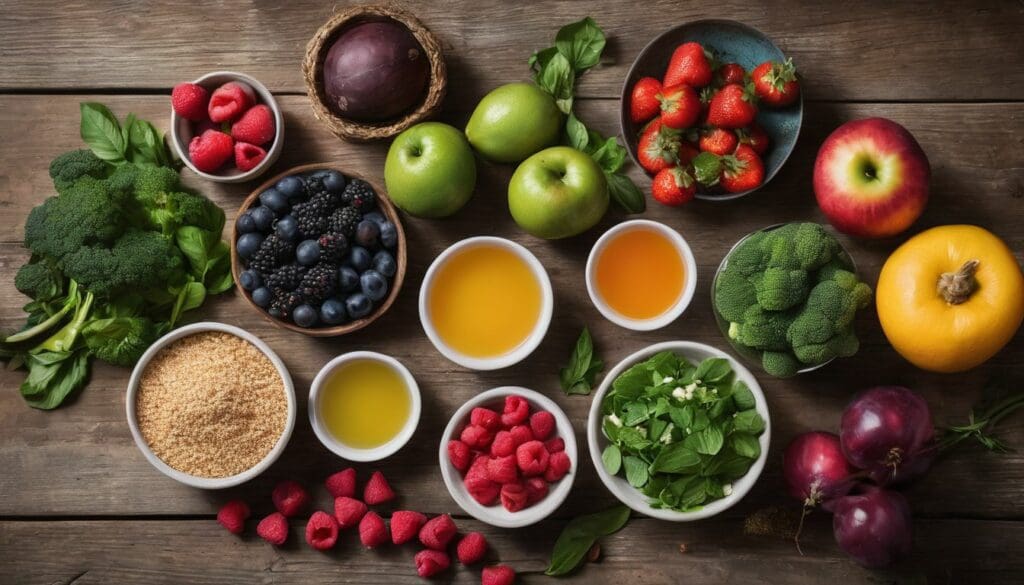Feeling tired and out of sorts is a common challenge we all face. The foods we eat have the power to turn that around – superfoods are a prime example. This article will uncover how these nutrient-packed treasures can elevate your health and vitality.
Ready for a change? Let’s dive in.
Key Takeaways
- Superfoods like berries, leafy greens, nuts, and fish are overflowing with vitamins, minerals, and antioxidants that combat inflammation and bolster the immune system.
- These nutrient – packed foods not only contribute to weight management but also improve skin health and provide sustained energy throughout the day.
- Including a variety of superfoods in your diet can be straightforward; blend berries into smoothies or add extra leafy greens to meals for an easy nutritional boost.
- Opting for superfood powders such as spirulina or maca provides a convenient way to enhance your nutrition while supporting sustainable farming practices.
- Tailoring your choice of superfoods according to personal health goals allows you to maximise their benefits while also promoting environmental conservation.
Understanding Superfoods
Superfoods are nutrient-rich foods that are considered to be especially beneficial for our health. They are packed with essential vitamins, minerals, and antioxidants, making them significant for maintaining a healthy diet.
Definition and characteristics of superfoods
Superfoods pack a powerful punch of vitamins, minerals, antioxidants, and other essential nutrients in every bite. Their high nutrient density means they’re not just good for your body; they’re efficient at delivering health benefits without excess calories.
Unlike ordinary foods, superfoods often contain higher levels of much-needed vitamins and minerals and a host of extra compounds like antioxidants which fight against free radicals that damage cells.
These natural powerhouses support weight management and offer anti-inflammatory properties that help maintain overall health. They improve heart health by reducing cholesterol levels and blood pressure.
Cognitive functions such as memory can also get a boost from these nutrient-rich ingredients. For those who care about the environment, incorporating more superfoods into their diet is an excellent decision because many grow sustainably with minimal impact on the earth’s resources.
Why superfoods are significant for our health
Superfoods play a crucial role in promoting overall health and well-being. By consuming nutrient-rich foods like berries, leafy greens, nuts, and fish, individuals can benefit from essential vitamins and minerals that support cognitive function, digestive health, and immune system support.
These superfoods also possess anti-inflammatory properties that aid in mental clarity and energy-boosting effects. Incorporating these balanced nutrition options into one’s diet not only provides health-promoting benefits but also supports sustainable farming practices, which align with the values of environmentally conscious individuals.
In addition to their nutritional value, superfoods are known for their antioxidant-rich properties. They offer an array of nutrients that support various bodily functions while contributing to conservation efforts through the promotion of nutrient-dense foods instead of processed options.
Top 10 Superfoods
Berries, leafy greens, nuts, fish, olive oil, whole grains, yogurt, cruciferous vegetables, legumes and tomatoes are among the top 10 superfoods that offer a wide range of health benefits.
These nutrient-dense foods are packed with essential vitamins and minerals to support overall well-being.
Berries
Blueberries, strawberries, raspberries, and blackberries are all considered superfoods due to their high antioxidant content. Berries are packed with vitamin C, fibre, and phytochemicals that help fight inflammation and support heart health.
These small fruits can also improve cognitive function and aid in preventing age-related memory loss. With their natural sweetness, they make a delicious addition to yoghurts, smoothies, and oatmeal.
Enjoying a handful of berries each day can contribute to your overall health and well-being while satisfying your sweet tooth.
Incorporating berries into your diet is an easy way to boost your nutrient intake without consuming excess calories or added sugars. Whether you prefer them fresh or frozen, adding a variety of berries to your meals offers numerous health benefits such as immune-boosting properties and skin-nourishing effects that promote radiant skin from the inside out.
Leafy greens
Moving on from the vibrant and nutritious berries, let’s dive into the health benefits of leafy greens. Leafy greens such as spinach, kale, and Swiss chard are packed with essential nutrients like vitamins A, C, and K, as well as iron and calcium.
These superfoods also offer a high level of antioxidants that help protect our cells from damage.
Incorporating leafy greens into your diet can support a healthy immune system while providing anti-inflammatory properties to benefit overall health. Their nutrient-dense nature makes them an excellent addition to any meal for those looking to boost their energy levels or promote weight loss in a natural way.
Nuts
Moving from the leafy greens to nuts, these crunchy little powerhouses are packed with essential nutrients and healthy fats. Nuts such as almonds, walnuts, and cashews contain heart-healthy monounsaturated fats, protein, fiber, vitamins, and minerals.
They are rich in antioxidants that help reduce inflammation in the body while also promoting cognitive support and providing an energy boost. Whether eaten raw or incorporated into meals and snacks, nuts offer a convenient way to add nutrient-dense foods to your diet.
For those focused on environmental conservation, incorporating sustainably-sourced nuts can align with their values of supporting responsible farming practices and reducing their ecological footprint.
Fish
Fish is a superfood rich in omega-3 fatty acids, which promote heart health and reduce inflammation. It is also an excellent source of high-quality protein and essential nutrients such as vitamin D and selenium.
Incorporating fish into your diet can support sustainable fishing practices, contributing to the conservation of marine life.
Consuming fish like salmon, mackerel, or sardines provides crucial nutrients with lower environmental impact compared to some other animal products. Additionally, choosing sustainably caught or farmed fish helps protect aquatic ecosystems while supporting responsible fishing practices.
Olive oil
Olive oil contains heart-healthy monounsaturated fats, antioxidants, and anti-inflammatory properties. It promotes good cholesterol levels and reduces the risk of heart disease. The rich nutrients in olive oil also support brain health and may help reduce the risk of depression.
Incorporate olive oil into your diet by using it as a salad dressing or for light sautéing to enjoy its health benefits without overpowering your dishes. Next up, let’s delve into the nutritional powerhouse of whole grains.
Whole grains
Transitioning from the health benefits of olive oil to whole grains, it’s essential to acknowledge the remarkable nutritional value that whole grains offer. Whole grains such as brown rice, quinoa, and oats are packed with essential nutrients and dietary fiber, making them a vital part of a balanced diet.
They play a significant role in promoting heart health, aiding digestion, and providing sustained energy levels throughout the day.
Incorporating whole grains into your meals not only adds depth and texture but also brings a plethora of health benefits to support your overall well-being. Fully embracing these nutrient-dense foods can contribute to both personal health and environmental conservation efforts by supporting sustainable agriculture practices for future generations.
Yogurt
Yogurt contains probiotics, which support gut health. This dairy product is also rich in calcium and protein, promoting bone strength and muscle development. Yogurt can be included in smoothies or enjoyed with berries for a nutritious breakfast option.
Additionally, yogurt can be used as a base for salad dressings instead of mayonnaise or sour cream. It’s important to choose organic yogurt from grass-fed cows to minimise the environmental impact of dairy farming.
By incorporating yogurt into your diet, you’re supporting sustainable agriculture while enjoying its numerous health benefits.
Cruciferous vegetables
Cruciferous vegetables, such as broccoli, cabbage, and Brussels sprouts, are packed with nutrients like vitamins C and K, fiber, and folate. They also contain compounds that have been linked to cancer prevention and anti-inflammatory properties.
Incorporating cruciferous vegetables into your diet can contribute to a healthy immune system while promoting skin health and providing an energy boost. These nutrient-dense foods can easily be included in meals or smoothies for their health-promoting benefits.
As part of a superfood diet rich in antioxidants and anti-inflammatory properties, cruciferous vegetables offer a variety of nutrients that support overall well-being. Whether it’s through recipes or meal plans, these superfood ingredients provide an excellent nutritional addition to environmentally conscious individuals’ diets who support conservation efforts.
Legumes
Legumes, such as beans, lentils, and chickpeas, are packed with nutrients like protein, fiber, and vitamins. They play a crucial role in sustainable agriculture by enriching the soil with nitrogen.
Including legumes in your diet can support environmental conservation efforts and contribute to sustainable food production.
Adding legumes to meals provides a healthy plant-based protein source while reducing the carbon footprint associated with meat consumption. Incorporating these nutrient-dense foods into your diet not only benefits your health but also supports environmentally conscious choices that promote conservation efforts.
Tomatoes
Tomatoes contain high levels of antioxidants, including lycopene, which have anti-inflammatory properties. These nutrients help to lower the risk of chronic diseases and support overall health.
Being a nutrient-dense food, tomatoes are also rich in vitamins A and C, promoting healthy skin and bolstering the immune system. Including tomatoes in your diet is an easy way to enjoy their health benefits, whether eating them raw in salads or incorporating them into cooked dishes.
With their vibrant color and versatile flavor, tomatoes can easily be integrated into daily meals to boost nutrition while supporting environmental conservation efforts by selecting organic or locally grown options.
Health Benefits of Superfoods
Superfoods are high in antioxidants, packed with essential nutrients, have immune-boosting properties, improve skin health, and promote weight loss. Read on to discover the amazing health benefits of superfoods!
High in antioxidants
Superfoods are high in antioxidants, which help protect the body from free radical damage. Berries, leafy greens, and tomatoes are packed with these powerful compounds that support overall health.
Antioxidants can help reduce inflammation and lower the risk of chronic diseases, making superfoods an essential part of a healthy diet. Incorporating antioxidant-rich foods into meals can contribute to boosting immunity and promoting skin health.
The immune-boosting properties found in antioxidant-rich superfoods make them an excellent choice for those looking to improve their overall well-being. By including nuts, fish, and cruciferous vegetables in your diet regularly, you can enjoy the benefits of energy-boosting effects while supporting conservation efforts through sustainable food choices.
Packed with nutrients
Superfoods are packed with essential nutrients, including vitamins, minerals, and antioxidants that support overall health. These nutrient-dense foods offer a wide range of beneficial compounds that can help combat inflammation and promote optimal well-being.
Incorporating superfoods into your diet can provide a convenient way to access these valuable nutrients while supporting environmental conservation efforts through sustainable food choices.
The high nutrient content in superfoods contributes to their ability to boost energy levels and enhance immune function, making them an excellent choice for those seeking natural ways to improve their overall health.
Immune-boosting properties
Superfoods like berries, leafy greens, and tomatoes are known for their immune-boosting properties. They contain high levels of antioxidants that help to strengthen the body’s natural defense system against infections and diseases.
Including these nutrient-dense foods in your diet can help support overall immune function and reduce the risk of falling ill.
Consuming a variety of superfoods rich in vitamins, minerals, and phytonutrients can contribute to a robust immune system. These foods play a crucial role in supporting our health and wellbeing.
Improves skin health
Superfoods like berries, leafy greens, and tomatoes have nutrients that promote skin health. Antioxidants in these foods help protect skin cells from damage caused by free radicals.
Nutrient-rich olive oil can also support healthy skin by reducing inflammation and moisturising the skin.
Incorporating these superfoods into your diet can contribute to vibrant and glowing skin. Including a variety of superfoods in your meals may provide essential vitamins and minerals necessary for maintaining optimal skin health, supporting an overall healthy complexion.
Boosts energy levels
Superfoods are packed with essential nutrients that can help boost energy levels throughout the day. Incorporating superfoods such as berries, nuts, and whole grains into your meals can provide a natural source of sustainable energy.
Leafy greens and cruciferous vegetables contain high levels of iron, which support healthy blood circulation and overall vitality. Consuming these nutrient-dense foods regularly can contribute to sustained energy levels without the need for artificial stimulants, promoting a more environmentally friendly approach to wellness.
Additionally, including antioxidant-rich superfoods like tomatoes and olive oil in your diet supports cellular function and reduces oxidative stress, contributing to long-lasting energy levels.
Promotes weight loss
Superfoods can aid weight loss due to their low-calorie and high-nutrient content. Incorporating superfoods like leafy greens, berries, and whole grains into your diet can help manage weight by providing essential nutrients while keeping calorie intake in check.
These nutrient-dense foods also support a healthy metabolism and may reduce cravings for unhealthy snacks.
Including superfoods such as nuts, fish, and yogurt in your meals can contribute to feeling fuller for longer periods, which can lead to reduced overall calorie consumption over time.
Incorporating Superfoods in Your Diet
Incorporating superfoods into your diet is easier than you think. From adding berries to your morning smoothie, to swapping out regular grains for whole grains, there are plenty of simple ways to boost your meals with the health benefits of superfoods.
Tips for incorporating superfoods in meals
Incorporating superfoods into your meals can be simple and rewarding. Here are some easy tips for adding these nutrient-rich foods to your diet:
- Start your day with a berry and yoghurt smoothie for a powerful antioxidant boost.
- Add leafy greens like spinach or kale to your salads, sandwiches, or wraps for added vitamins and minerals.
- Snack on nuts like almonds or walnuts instead of processed snacks for a satisfying energy boost.
- Include fish in your meals at least twice a week for its omega-3 fatty acids and anti-inflammatory properties.
- Use olive oil as a healthier alternative when cooking or dressing your salads.
- Swap out refined grains for whole grains like quinoa, brown rice, or barley in your meals for extra fibre and nutrients.
- Incorporate cruciferous vegetables such as broccoli, cauliflower, or Brussels sprouts into your stir-fries, soups, or salads.
- Experiment with incorporating legumes like chickpeas, lentils, or black beans into various dishes such as stews, curries, or salads.
- Utilise tomatoes in sauces, soups, and sandwiches to benefit from their high levels of lycopene and vitamin C.
Superfood powders and their benefits
Superfood powders are concentrated sources of essential nutrients, making them a convenient addition to your diet. These powders often contain a variety of vitamins, minerals, and antioxidants that support overall health and well-being.
Additionally, superfood powders can easily be incorporated into smoothies, yoghurts, or energy balls to provide an extra boost of nutrition in your meals.
When selecting superfood powders, it’s important to choose ones that are organic and sustainably sourced. By doing so, you can ensure that you’re supporting environmentally conscious practices while reaping the nutritional benefits of these nutrient-dense foods.
How to choose the right superfoods for your needs
When selecting superfoods for your needs, consider your health goals and dietary preferences. Look for nutrient-dense options such as leafy greens, berries, and nuts to support overall well-being.
Assess the anti-inflammatory properties of different superfoods like fish, olive oil, and tomatoes to aid in reducing inflammation within the body.
Furthermore, seek out energy-boosting superfoods like whole grains and yogurt to sustain vitality throughout the day. Tailoring your choices based on these factors can help you incorporate superfoods that align with your specific health requirements while promoting environmental conservation.
Conclusion
In conclusion, incorporating nutrient-rich superfoods into your diet can significantly improve your overall health. These foods are packed with antioxidants and essential nutrients that provide anti-inflammatory and immune-boosting properties.
By making simple changes to your meals, you can enjoy the energy-boosting effects of these nutrient-dense foods.
FAQs
1. What are superfoods and why are they considered so beneficial?
Superfoods are foods that are rich in nutrients and can offer health-promoting benefits like anti-inflammatory and immune-boosting properties.
2. Can superfoods help to boost my energy levels?
Yes, many superfoods have energy-boosting effects due to their high nutrient content, helping you feel more energised throughout the day.
3. How do antioxidants in superfoods affect my health?
Antioxidant-rich foods can protect your body from damage by harmful molecules called free radicals, supporting overall well-being.
4. Are there easy ways to include superfoods in my diet?
Definitely! You can try different superfood recipes or add superfood supplements and smoothies into your meal plans for a nutritious boost.
5. Can creating a meal plan with superfoods improve my health?
Incorporating a variety of nutrient-dense foods into a structured meal plan may enhance your diet’s nutritional value and contribute to better health.





